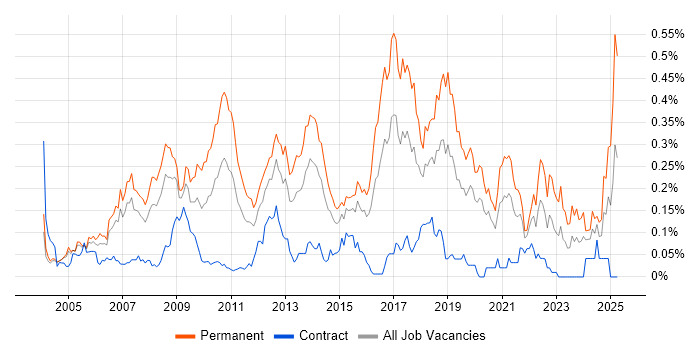Lead .NET Developer
Central London > City of London
The median Lead .NET Developer salary in the City of London is £112,500 per year, according to job vacancies posted during the 6 months leading to 9 May 2025.
The table below provides salary benchmarking and summary statistics, comparing them to the same period in the previous two years.
|
|
6 months to
9 May 2025 |
Same period 2024 |
Same period 2023 |
| Rank |
135 |
171 |
221 |
| Rank change year-on-year |
+36 |
+50 |
+55 |
| Permanent jobs requiring a Lead .NET Developer |
7 |
6 |
6 |
| As % of all permanent jobs advertised in the City of London |
0.34% |
0.18% |
0.13% |
| As % of the Job Titles category |
0.37% |
0.19% |
0.13% |
| Number of salaries quoted |
6 |
4 |
6 |
| 10th Percentile |
£82,500 |
£58,400 |
£69,375 |
| 25th Percentile |
£90,625 |
£58,625 |
£76,875 |
| Median annual salary (50th Percentile) |
£112,500 |
£72,500 |
£85,000 |
| Median % change year-on-year |
+55.17% |
-14.71% |
-15.00% |
| 75th Percentile |
£130,000 |
£87,188 |
£87,500 |
| 90th Percentile |
£135,000 |
£88,875 |
£91,875 |
| Central London median annual salary |
£112,500 |
£82,500 |
£85,000 |
| % change year-on-year |
+36.36% |
-2.94% |
-12.82% |
For comparison with the information above, the following table provides summary statistics for all permanent IT job vacancies in the City of London. Most job vacancies include a discernible job title that can be normalized. As such, the figures in the second row provide an indication of the number of permanent jobs in our overall sample.
| Permanent vacancies in the City of London with a recognized job title |
1,910 |
3,208 |
4,455 |
| % of permanent jobs with a recognized job title |
92.90% |
95.85% |
96.20% |
| Number of salaries quoted |
1,458 |
2,545 |
3,737 |
| 10th Percentile |
£41,250 |
£41,000 |
£42,500 |
| 25th Percentile |
£52,500 |
£52,500 |
£55,000 |
| Median annual salary (50th Percentile) |
£72,500 |
£73,750 |
£75,000 |
| Median % change year-on-year |
-1.69% |
-1.67% |
+3.45% |
| 75th Percentile |
£95,000 |
£95,000 |
£97,500 |
| 90th Percentile |
£120,000 |
£112,500 |
£112,500 |
| Central London median annual salary |
£72,500 |
£72,500 |
£73,480 |
| % change year-on-year |
- |
-1.33% |
+1.35% |

